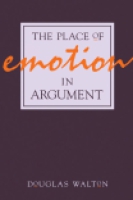The Place of Emotion in Argument
Douglas Walton
“Walton offers some very perceptive criticisms and points on the subject of emotional appeals. His critique of the standard textbook treatment of the subject is a valuable counter to the excesses of the conventional wisdom that this treatment perpetuates, and his observations on the necessity of considering context when assessing the cogency of arguments based on emotional appeals throw important light on the subtleties of such assessments. In these and other ways his book corrects and enlarges our understanding of informal fallacies.”
- Description
- Reviews
- Subjects
First, is it reasonable, even if not conclusive, as an argument?
Second, is it weak and therefore open to critical questioning for argument? And third, is it fallacious?
The third category is a strong charge that incurs a critical burden to back it up by citing evidence from the given text and context of dialogue.
Walton uses fifty-six case studies to demonstrate that the problem of emotional fallacies is much subtler than has been previously believed. Ranging over commercial advertisements, political debates, union-management negotiations, and ethical disputes, the case studies reveal that these four types of appeals, while based on presumptive reasoning that are tentative and subject to default, are not always or necessarily fallacious types of argumentation.
“Walton offers some very perceptive criticisms and points on the subject of emotional appeals. His critique of the standard textbook treatment of the subject is a valuable counter to the excesses of the conventional wisdom that this treatment perpetuates, and his observations on the necessity of considering context when assessing the cogency of arguments based on emotional appeals throw important light on the subtleties of such assessments. In these and other ways his book corrects and enlarges our understanding of informal fallacies.”
Mailing List
Subscribe to our mailing list and be notified about new titles, journals and catalogs.




